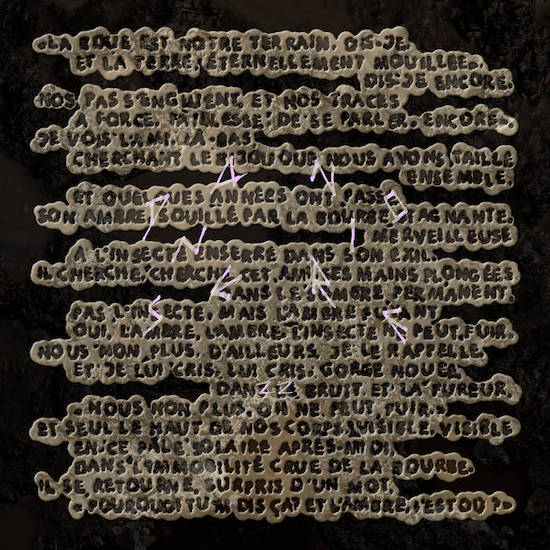It appears that everything is fragmented at the moment. Our means of talking to each other used to be limited to either face-to-face conversations or a home telephone. Now, if you choose, you can be contacted in at least a dozen different ways (phone, email, text, messenger, WhatsApp, Twitter, Instagram, etc., etc.). Then factor in how the last few years have disrupted how people work and interact with each other. Most days I will have face-to-face interactions with three or four people, and one of them is a pre-schooler. On his new album Amitiés (loosely translated as ‘friendship’), the Montréal-based artist Racine tackles this head on. Not only is this, along with isolation of the mind and body, a major theme it’s also how the album sounds.
First track ‘Mon amour je ne guéris jamais’ starts to fragment before us. Field recordings and lopsided synths spring from a croaky harmonium. A disjointed drum pattern emerges. It is huge and echoey, like it was recorded in a disused factory. This gives the album a harsh, industrial feel, yet the gasping sounds seeping from the harmonium give it an organic feel. This is repeated throughout the album and Racine sets up what to expect, while never really showing is hand.
Title track ‘Amitiés’ possesses the nearest thing to a melody on the album. Opening with a stark piano, Racine then layers strings with samples that sound like water sloshing against a dock or someone opening the lid of the piano, a drill breaking up concrete, feedback, fire burning and disjointed vocal sounds. The samples have been manipulated, sounding eroded, in a way that makes identifying their origin almost impossible. All of this combines to create something that is harrowing but also full of humanity.
At times this album brings to mind Cristobal Tapia de Veer’s score for the television show Utopia. Both the images and the score were unsettling, almost unpleasant at times, though I found it almost impossible to stop watching. I experienced the same listening to ‘Amitiés’. The urge to skip on to the next track was there, but I couldn’t as I had to know how it ended.
‘Cacouna’ mostly features the sounds of birds cawing. This is after forty seconds of an uncomfortable metallic noise. The sounds of birds bring Amitiés back to reality. So far everything feels like it was created in a sterile environment, but with the birds cawing we are given something to latch on to that grounds it in our reality. It feels weirdly homely. Before ‘Cacouna’ everything was slowly disintegrating before us. Sounds swept around us in a way that it was hard to fathom where they were from or how they connect together and to us. By adding the sounds of the natural world, we are being reminded that everything we hear takes places in the real world and wasn’t construed in a studio.
The album closes with ‘Terme’ which features a glorious, elongated drone. As ‘Terme’ progresses the intensity builds. This ends the album on a reflective, and slightly, meditative note.
At times Amitiés is a hard listen. Parts of it aren’t that enjoyable and, if I’m being honest, I was glad when they had finished. Amitiés doesn’t obey the rules of conventional music. Racine isn’t interested in creating something with hooks or basslines. Instead, he has constructed an album of sounds that reproduce – or that interrupt – the feeling of the time it was created. In this way Amitiés is more of an audio time capsule.
What Amitiés does really well is recreate that feeling of isolation at its worst. Those moments when you are rattling about through your home, and you feel you are the only person left on Earth. The music builds and echoes off itself, then part of it disintegrates before us. Then the song changes. There are swells of strings or explosions of drums and you are reminded that you aren’t alone, and anything is possible. There are other people out there to interact with when you can. And this is really what the album seems to be about. Hope and friendship. A hope that after this you will be able to have those tender moments again with friends. That you’ll be able to contact people out of the blue and arrange an impromptu meet up. It’s been a hard few years, but that will make these moments of interaction with friends even sweeter.


